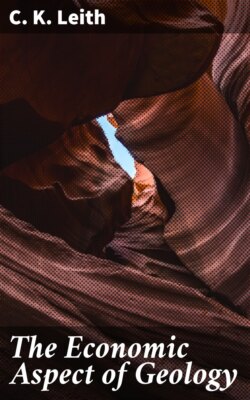Читать книгу The Economic Aspect of Geology - C. K. Leith - Страница 9
На сайте Литреса книга снята с продажи.
SURVEY OF FIELD
ОглавлениеTable of Contents
In adapting ourselves to physical environment it has been necessary to learn something about the earth. Mainly within the last century has this knowledge been organized into the science of geology, and only within the last few decades have the complex and increasing demands of modern civilization required the applications of geology to practical uses, resulting in the development of the science generally known as economic geology. This science is not sharply marked off from the science of geology proper; almost any phase of geology may at some time or some place take on its economic aspect.
The usefulness of economic geology was first recognized in relation to mineral resources—and particularly in relation to metallic resources, their discovery and development—but the science has been found to have much wider practical application. The practice of the economic geologist in recent years has taken on many new phases.
The geologist is called upon to study the geologic features of mineral deposits, their occurrence, structure, and origin. The basic information thus acquired is useful in estimating reserves and life of mineral deposits. This leads naturally to considerations of valuation. Because valuation plays such a large part in any tax program, the geologist is being used by tax boards of the federal and state governments.
Both in the formulation of laws relating to mineral resources, and in the litigation growing out of the infraction of these laws, the economic geologist plays a part.
One cannot go very far with the study of mineral resources without consideration of the question of conservation. Geologists are called on not only for broad surveys of the mineral reserves, but for the formulation of general principles of conservation and their application to specific mines and minerals.
The geologist's familiarity with the distribution and nature of mineral resources has given him a part in coping with broad questions of international use of natural resources. War conditions made it necessary to use new sources of supply, new channels of distribution, and new methods of utilization. The economic geologist came into touch with questions of international trade, tariffs, and shipping.
But economic geology is not solely confined to mineral resources. In relation to engineering enterprises of the greatest variety—canals, aqueducts, tunnels, dams, building excavations, foundations, etc.—geology now figures largely, both in war and in peace.
The nature, amount, and distribution of underground water supplies are so involved with geologic considerations that a considerable number of geologists give up their time wholly to this phase of the subject.
It might seem from this list of activities that geology is spreading too far into the fields of engineering and commerce, but there are equally rapid extensions of other fields of knowledge toward geology. The organization of these intermediate fields is required both in the interest of science and in the interest of better adaptation of the race to its environment. The geologist is required to do his part in these new fields, but not to abandon his traditional field.
It is proposed in this volume to discuss the economic aspects of geology without exhaustive discussion of the principles of geology which are involved. Practically the whole range of geologic science has some sort of economic application, and it would be futile to attempt in one volume even a survey of the science of geology as a whole. Our purpose is rather to indicate and illustrate, in some perspective, the general nature of the application of geology to practical affairs.
In professional preparation for the practice of economic geology there is no easy short-cut. Students sometimes think that a smattering of geological principles, combined with a little business and economic information, may be sufficient. Analysis of professional successes should make it clear that economic geologists are most effective and in most demand, not primarily because of business aptitude, though this helps, but because of their proficiency in the science of geology itself. In short, to enter successfully the field of economic geology one should first become a scientist, if only in a limited field.
The traditional conception of the geologist as a musty and stooped individual, with a bag, hammer, and magnifying glass, collecting specimens to deposit in a dusty museum, will doubtless survive as a caricature, but will hardly serve to identify the economic geologist in his present-day work. In writing this book, it is hoped in some measure to convey an impression of the breadth and variety in this field. Few other sciences offer so wide a range of opportunity, from the purely scientific to the practical and commercial, coupled with travel, exploration, and even adventure.
